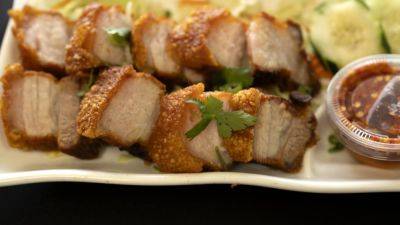Accusing minority communities of eating pets is a practice as American as apple pie
It is a practice that's about as American as apple pie — accusing minority communities of engaging in bizarre or disgusting behaviors when it comes to what and how they eat, a kind of shorthand for saying they don't belong.
The latest iteration came at Tuesday's presidential debate, when former President Donald Trump spotlighted a false online tempest around the Haitian immigrant community of Springfield, Ohio. He repeated the groundless claim previously spread by his running mate, JD Vance, that the immigrants were stealing dogs and cats, the precious pets belonging to their American neighbors, and eating them. The furor got enough attention that officials had to step in to refute it, saying there was no credible evidence of any such thing.
But while it might be enough to turn your stomach, such food-based accusations are not new. Far from it.
Food-related scorn and insults were hurled at immigrant Chinese communities on the West Coast in the late 1800s as they started coming to the United States in larger numbers, and in later decades spread to other Asian and Pacific Islander communities like Thai or Vietnamese. As recently as last year, a Thai restaurant in California was hit with the stereotype, which caused such an outpouring of undeserved vitriol that the owner had to close and move to another location.
Behind it is the idea that “you’re engaging in something that is not just a matter of taste, but a violation of what it is to be human,” says Paul Freedman, a professor of history at Yale University. By tarring Chinese immigrants as those who would eat things Americans would refuse to, it made them the “other.”
Other communities, while not being accused of eating pets, have been criticized for the perceived







